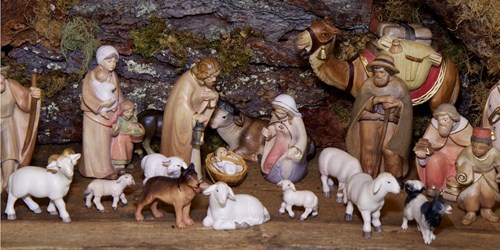
Growing up in a small town in the South, you didn't have to be a Christian to know the Christmas story.
Every church puts on the same Christmas play and light display: baby Jesus lying in a manger surrounded by his parents, Mary and Joseph, the shepherds and wise men who traveled to see Him, and the angel who announced His arrival to the world.
But if we look outside of Luke 2, we discover that Jesus' arrival affected a lot more people than those huddled around the manger that night.
Two Lesser-Known People in the Christmas Story
1. Simeon (Luke 2:25-35)
Simeon was a man who loved God. As a priest, Simeon was well-trained in Jewish law, literature, and tradition. He would have been an expert in God’s Word, having memorized the first five books of the Bible. Simeon knew the prophecies about the Messiah who was to come and rescue Israel. Not only that, the Holy Spirit told Simeon that he would not die until he saw the Lord’s Christ.
People had been waiting for the Messiah for more than 400 years when Jesus was born. As the years passed, and Simeon grew older, he must have wondered if God was really going to come through on that promise.
Then, the day Mary and Joseph presented Jesus at the temple, the Holy Spirit led Simeon to the temple as well. In the moment they met, a lifelong promise was fulfilled. Simeon took Jesus in his arms and blessed Him, telling Mary and Joseph all that Jesus would do.
Imagine seeing a promise you’ve been clinging to come to fruition right in front of you. Maybe it’s the promise that your marriage would be restored, that the baby you’ve waited for is coming, that the sickness will be healed. Simeon’s story is a reminder to us that God always comes through on His promises. Our God is a promise maker and a promise keeper.
2. Anna (Luke 2:36-38)
A prophet named Anna was also at the temple during this time. Anna was married for seven years before her husband died. By the time Jesus was born, she had been a widow for more than 80 years.
Anna never left the temple but worshiped night and day, fasting and praying. Her discipline and devotion over the course of her life put her in the position to meet Mary, Joseph, and Jesus as they walked through with Simeon. Anna then started to spread the news that this child was different. The Bible says, “she gave thanks to God and spoke about the child to all who were looking forward to the redemption of Jerusalem” (Luke 2:38).
Anna saw years of fasting, praying, and worshipping culminates in that moment. As a result of her faith in the day-to-day, Anna witnessed the Son of God herself and had the opportunity to speak of the redemption and hope He would bring.
Anna’s story reminds us that daily obedience and devotion puts us in a position to see the miraculous. The time we spend with God draws us closer to Him, and it’s when we’re closest to God that we’re best able to recognize His work in our lives.
Jesus’ birth affected many more people than the ones we see in Christmas pageants and light displays. Jesus’ birth rocked Simeon’s world, Anna’s world, and ours as well. Without Jesus in the manger, we would not have Jesus on the cross. Without Jesus on the cross, we would not have salvation and we would still be separated from God.
The Christmas story is one of prayers answered and miracles witnessed, promises fulfilled and hope restored. It’s an old story and a new story. It’s Jesus’ story, and it’s our story.